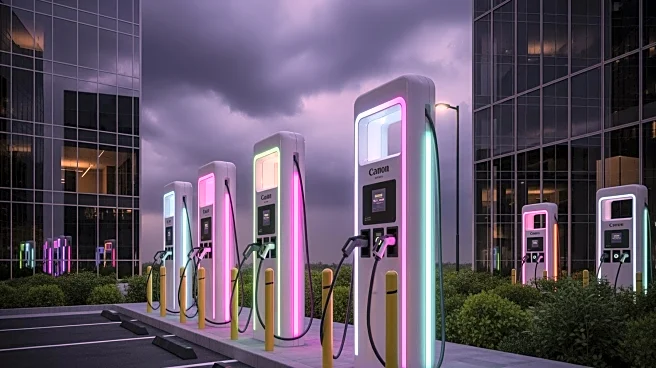What's Happening?
The U.S. electric vehicle (EV) industry is experiencing significant challenges due to policy changes and an ongoing trade war with China. The Trump administration has reduced government support for the
EV sector, including the elimination of the electric vehicle tax credit, which expired recently. This has led to a slowdown in demand and a pullback by manufacturers. General Motors reported a $1.6 billion hit on its quarterly earnings due to decreased EV operations value. Ford is shifting focus to partial electrification rather than fully electric models. Globally, EV sales reached a record 2.1 million in September, driven by strong sales in China, which accounted for two-thirds of global sales. China benefits from government subsidies and infrastructure incentives, leading to overproduction and increased exports. The U.S. is falling behind in the global EV race, exacerbated by the trade war affecting rare earth mineral supplies crucial for EV production.
Why It's Important?
The decline in the U.S. EV industry has significant implications for the country's automotive sector and its position in the global market. The removal of the EV tax credit increases the cost burden on consumers, potentially reducing demand further. The trade war with China threatens the supply of rare earth minerals essential for EV production, risking further disruptions. As China and Europe advance in EV sales, the U.S. risks losing its competitive edge in the automotive industry, which could impact jobs and economic growth. The shift away from EVs may also affect environmental goals and the transition to sustainable energy solutions.
What's Next?
The ongoing trade war with China and the lack of government incentives for EVs in the U.S. suggest continued challenges for the industry. Manufacturers may need to adapt by focusing on hybrid models or exploring alternative markets. The U.S. government could reconsider its stance on EV subsidies to stimulate demand and support domestic production. The trade dispute over rare earth minerals remains unresolved, with potential for further escalation affecting the EV supply chain. Industry experts warn that without a transition to new energy vehicles, the U.S. could lose its global automotive leadership.
Beyond the Headlines
The U.S. EV industry's struggles highlight broader issues in trade policy and environmental strategy. The reliance on rare earth minerals underscores the geopolitical complexities of resource dependency. The shift in automotive focus may influence cultural perceptions of sustainability and innovation. Long-term, the U.S. may need to invest in domestic mineral production and renewable energy infrastructure to compete globally. The situation also raises ethical questions about environmental responsibility and economic priorities in policymaking.










